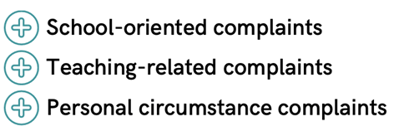
How to avoid parent complaints: 5 strategies for schools
Dealing with parent complaints can be challenging; they can damage parents’ perceptions of the school and reduce the confidence of parents and staff. Clear and effective conflict resolution strategies are essential for calming upset and angry parents. But how can you avoid these parent complaint situations? Your school communication platform is a vital tool for helping avert complaints, used proactively it can help prevent parental frustrations and reduce miscommunications or misunderstandings. This article explores five ways to use your school communication software effectively to avoid parent complaints and build positive home-school relationships simultaneously.
What are the leading causes of parent complaints?
The most common reasons why parents complain to the school can be separated into three categories:
 All categories can involve singular parent complaints or may extend to groups of parents who all have the same concerns and frustrations. Each parent complaint requires understanding, empathy and historical knowledge from teachers and the leadership team when managing; however, some common complaints can often be avoided through regular, quality communication between school and home.
All categories can involve singular parent complaints or may extend to groups of parents who all have the same concerns and frustrations. Each parent complaint requires understanding, empathy and historical knowledge from teachers and the leadership team when managing; however, some common complaints can often be avoided through regular, quality communication between school and home.
School-oriented complaints
The most common parent complaints often surround school-oriented procedures and processes, for example, school uniforms, detention processes, homework policies, behaviour expectations, sanctions and fines related to poor attendance. School policies may sometimes need to change to reflect new priorities and if changes are not communicated thoroughly, it may cause heightened frustrations and misunderstandings with parents and lead to parent complaints. Parents can be kept up-to-date with any policy amendments or updates through notifications sent on their Weduc parent app. If changes are a result of a new headteacher coming on board an introduction letter or video can be an effective way to share their vision and aims for the school.
Teaching-related complaints
Stemming from a position of frustration, parents can become angry when they feel their child isn’t receiving a high-quality education. This can be due to several reasons; unidentified or supported Special Educational Needs and Disabilities (SEND); English as Additional Language (EAL); perceived low-quality teaching or feedback; and online learning or homework frustrations. These complaints can be challenging to resolve as they often centre around a particular staff member and may not be brought to the attention of the senior leadership team until the parent has reached a crisis point. Offering parents controlled contact with teachers via the school’s communication platform can help to make the parents feel heard, and voice concerns early. This can also provide a useful, clear record of parent-teacher communications if a complaint escalates further.
Personal circumstance complaints
Often the most volatile parent complaints, the parent may be in crisis due to challenging home circumstances and may react unreasonably to something the school enforces or introduces. Parents experiencing challenges at home can be supported carefully by your school’s pastoral team; remind any staff members - especially Early Career Teachers (ECTs) - the importance of seeking additional colleague support when they feel a parent complaint may be due to their circumstances if they feel the reaction may be unwarranted.
How can parent complaints be turned into a positive experience?
Although challenging at the time, parent complaints can be used to increase confidence in your leadership from staff and parents alike. Remaining calm and supportive of staff sets a precedent of how you stick to agreed policies and procedures during complaints or dealing with parents. If your school employs ECTs, having a complaints procedure regularly evaluated for success can bring great confidence when learning how to support an irate or frustrated parent effectively. When dealing with an angry parent whose complaint falls into the ‘personal circumstance’ category, use the experience as an opportunity to share external support services via your communication platform to support other families who may be experiencing the same challenges.
The effectiveness of your website and the ease of use can also be evaluated when a parent complaint is dealt with. Should the policies and information about the school day be more visible and shared more frequently to avoid future misunderstandings? Are the parents aware of the expectations for their child’s behaviour, uniform, attendance, and punctuality?
5 ways to avoid parent complaints in schools
1. Be proactive, not reactive with parental concerns
Discuss with your leadership team the importance of building a solid parental engagement and working relationships foundation. Highlight previous trends with parental complaints, how they were handled and what could be improved with the process. When planning to implement a new initiative, policy change or alteration to the school timetable, consider a SWOT analysis to allow for effective communication before any frustrations arise.

2. Build positive parent relationships
Trusting relationships are essential when introducing new initiatives or reminding parents of existing school expectations. Parents respond to initiatives better when they are aware of the intentions driving the decisions, transparency of school priorities and sharing your school brand and vision regularly via your parent app or communication platform can help to build trust. Positive parental engagement can be shown in many ways: interacting with posts on social channels, completing regular school surveys, attending school events and working effectively with class teachers to help their child reach their potential.
3. Communicate regularly (and with purpose)
Most parent frustrations can stem from miscommunication or a lack of; remedy this by ensuring your staff post regularly across the parent app and all social channels (Twitter, Facebook). However, posting regularly is not a magic fix to avoid parent complaints; your interaction with parents must be purposeful, helping them to solve a problem or informing them of information relevant to their child. Weduc’s communication platform allows one post to be simultaneously shared across all social media channels, parent newsfeed and website, reducing staff workload and increasing communication reach.
4. Listen to parents' concerns
Having three parents’ evenings per year may not be enough home-school interaction for some families, especially those hard-to-reach parents. Organising regular opportunities for parents to express their gratitude, concerns and frustrations throughout the year, making sure your parents feel heard and supported, can reduce the number of complaints your teaching staff handle. Consider parent contact points each term (include the options for virtual interactions like video calls) whilst being mindful of teacher workload by including drop-in sessions and online workshops, and regularly utilise the two-way communication feature of your parent app. Share upcoming ideas and gather responses to new initiatives across a parent representative such as the school’s PTA or parent-governor team.
5. Follow up on parent complaints
Any parent complaints should be taken seriously, highlighting weaknesses in your communication strategy for one of the three most common reasons for parent complaints. Encourage your heads of departments, key stage leaders and Teaching Leadership Responsibility (TLR) staff members to analyse complaint trends. Are there whole-school changes you can introduce to strengthen that area of communication? Consider auditing your current parent communication platform to assess how effectively it allows parents to communicate with teachers, sharing school events and information across multiple channels (the school's private Weduc newsfeed, Twitter, Facebook, and the school website).
How can Weduc help to defuse frustrated parents?
- Weduc’s tailored newsfeed allows parents to receive only relevant notifications to their child’s class and cohort, increasing the likelihood of positive and active engagement.
- Share message posts across all social media channels, Weduc’s newsfeed and website with one click to increase the reach of the school’s communication. Weduc also highlights to the admin team, parents who cannot connect to the Weduc app (due to lack of technology), so no families are excluded from school communications.
- Create and run unlimited parent surveys across the academic year, gathering parent responses to important school decisions such as uniforms, healthy meal choices, extra-curricular club options and homework expectations.
- Defuse any misunderstandings surrounding school policies by sharing unlimited documents via the parent hub, and school website and having access to the school’s most recent policies.
- Increase parental technological support with Weduc’s UK-based customer support team, helping parents and schools daily.
- Make parent communication simple and sympathetic to life’s challenges with small but mighty features such as absence report forms available to fill out day or night to avoid queuing for the front office team at 8 am when the phones open.
Want to find out more about how Weduc can help your school to increase parental engagement levels? Book a chat directly with us today at a time that suits you.


